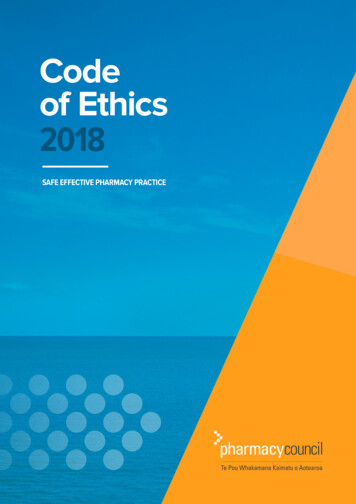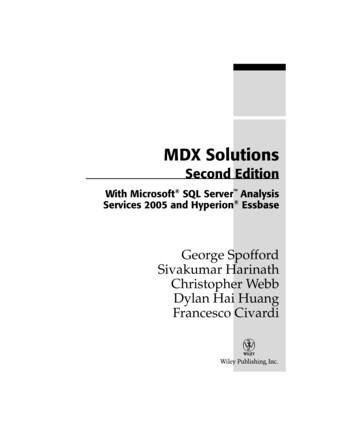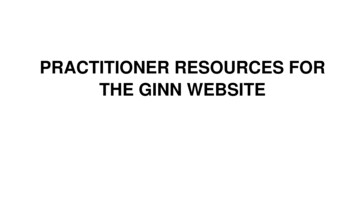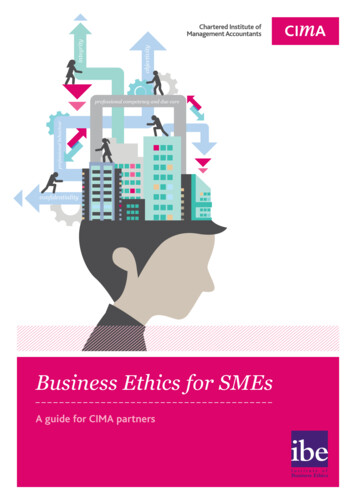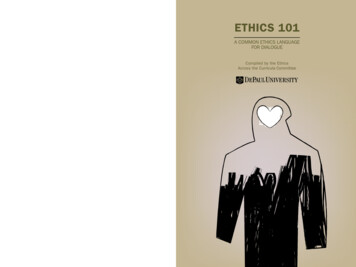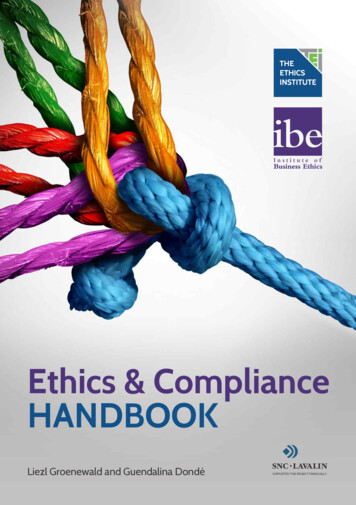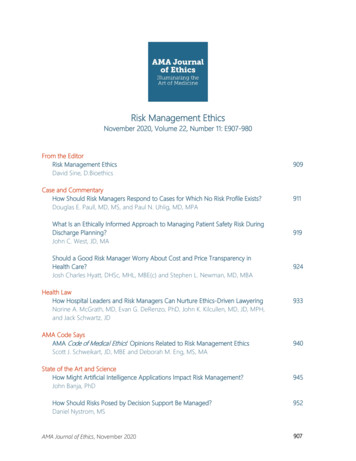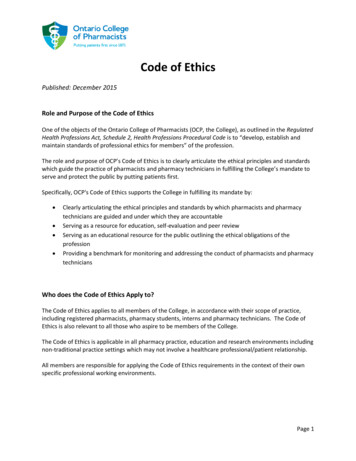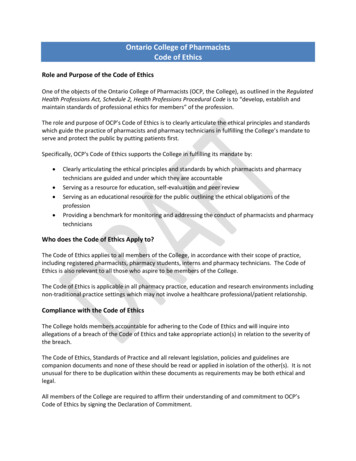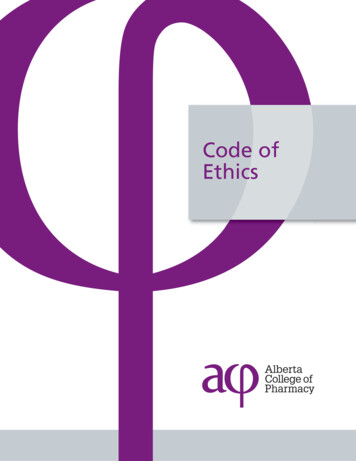
Transcription
Code ofEthics
PreamblePharmacists and pharmacy technicians play pivotal roles in the continuum ofhealth care provided to patients. The responsibility that comes with being anessential health resource is significant. To retain the high level of trust andrespect that is given to pharmacists and pharmacy technicians by patients,the public and other health professionals, pharmacists and pharmacytechnicians must be both competent and professional in all they do. Asprofessionals, pharmacists and pharmacy technicians are challenged andexpected to abide by a higher standard of conduct.Ethics are the foundation for professional behavior, actions and attitudes.The ACP Code of Ethics reflects what the pharmacist and pharmacytechnician professions stand for and reinforces what is unique about thecontributions of pharmacists and pharmacy technicians to patients, tosociety and to their professions. Ethics reflect the soul of each profession.Consistent ethical behavior creates a positive image of the individual thatextends to the image of the professions. In contrast, unethical practices anddecisions create a negative image of and diminish trust and credibility aboutthe individual and raise suspicion about the professions.The Code of Ethics supports ACP in fulfilling its mandate to protect thepublic. The Code of Ethics enables the ACP to provide direction topharmacists and pharmacy technicians faced with ethical dilemmas.The Code of Ethics also allows the ACP to provide guidance to universitiesand colleges for student curricula. The Code of Ethics serves as abenchmark for monitoring and addressing the conduct of pharmacistsand pharmacy technicians.Alberta College of Pharmacy / Code of Ethics / Effective May 22, 2009
ApplicationThe Code of Ethics forms part of the law that governs the practice ofpharmacy and the operation of pharmacies. The Code of Ethics cannot beread and applied in isolation. It must be read together with and in thecontext of the legislative and regulatory framework which includes theHealth Professions Act, the Pharmacy and Drug Act, the regulations andstandards made under those Acts, other provincial and federal legislationrelating to drugs, and provincial and federal privacy legislation.This Code of Ethics applies to all regulated members of the ACP underthe Health Professions Act. References to pharmacists in this Codemust be read as including clinical pharmacists, provisional pharmacists,courtesy pharmacists and pharmacy students. References to pharmacytechnicians must be read as including pharmacy technicians, provisionalpharmacy technicians and pharmacy technician students. The Code ofEthics also applies to the operation of pharmacies and to the conductof licensees and proprietors under the Pharmacy and Drug Act.The Principles and the Guidelines in the Code of Ethics are binding andregulated members are required to comply with them. The ACPrecognizes that there may be circumstances where the practice of amember is limited by the legislative and regulatory framework or by acondition on a permit or licence with the result that a particularguideline may not apply to the practice of that member.Alberta College of Pharmacy / Code of Ethics / Effective May 22, 2009
PrinciplesPharmacists and pharmacy technicians use their knowledge, skills andresources to:nServe patients,nContribute to society, andnAct as stewards of their professions.As a pharmacist or as a pharmacy technician, I must:PatientsSocietyProfession1Hold the well-being of each patient to be my primary consideration2Respect each patient’s autonomy and dignity3Maintain a professional relationship with each patient4Respect each patient’s right to confidentiality5Respect each patient’s right to health care6Advance public health and prevent disease7Use health resources responsibly8Serve as an essential health resource9Ensure that I am competent10Act with honesty and integrity11Demonstrate responsibility for self and other health professionals12Nurture the professionAlberta College of Pharmacy / Code of Ethics / Effective May 22, 2009
Alberta College of Pharmacy / Code of Ethics / Effective May 22, 2009
PatientsPRINCIPLE 1Hold the well-being of each patient to be my primary considerationTo uphold this principle, I :1.Act in the best interest of each patient.2.Provide appropriate treatment and care.3.Actively seek out information to make10. Avoid conflict of interest and declare anypersonal or professional interests to anypatient who may be affected.11. Resolve any conflict of interest that mayarise in the interest and for the well-informed decisions.4.Advocate for appropriate drug therapybeing of the patient affected.12. Do not allow my professional judgmentthat meets each patient’s values andto be impaired by personal orhealth goals.5.6.commercial benefits such as monetaryProvide drugs, non-prescriptionor financial gain or incentive targets.medicines or health-related productsI do not ask for or accept gifts,that are from safe and proven sources.inducements, hospitality or referrals thatmay affect or be perceived to affect myDispense, distribute or promote drugs,professional judgment.non-prescription medications orhealth-related products that are of13. Do not enter into any arrangementgood quality only.7.with a patient where I provide aninducement to the patient that isSafeguard the well-being of eachconditional on the patient obtaining apatient and in particular any patientdrug or professional service from me.who is vulnerable.8.Prevent harm to each patient; but,14. Cooperate with colleagues and otherhealth professionals to assist a patient toshould harm occur, disclose it to theachieve the patient’s health care goals.patient, and initiate steps tomitigate/treat the harm.9.15. Consult with other health professionalsDo not exploit a patient for personaladvantage.Alberta College of Pharmacy / Code of Ethics / Effective May 22, 2009 / May 1, 2014to benefit a patient as appropriate.
PatientsPRINCIPLE 2Respect each patient’s autonomy and dignityTo uphold this principle, I :1.7.Avoid discriminating against anypatient on grounds such as age,Listen to each patient and thegender, marital status, medicalpatient’s caregivers and seek tocondition, national or ethnic origin,understand the patient’s values andphysical or mental disability, politicalhealth goals.affiliation, race, religion, sexual2.Meet the individual communicationorientation or socioeconomic status.needs of each patient.3.(This does not restrict the right toProvide each patient with anyrefuse to accept an individual as ainformation that the patient needs topatient for legitimate reasons.)make informed decisions about the8.patient’s health and health care andis not competent where those intentionsdiscuss that information with thewere expressed before the patientpatient.4.5.became incompetent (e.g., throughProperly inform each patient about drugdirections provided in a personaltherapy and reasonable alternatives.directive or through the appointment ofan agent under an advance directive).Respect the right of a competentpatient to accept or reject any6.Respect the intentions of a patient who9.Give each patient access to informationtreatment, care or other professionalin that patient’s record unless restrictedservices.by law or unless it is not in the patient’sRespect the autonomy of a patientwho is a minor and who is able tomake decisions about the patient’shealth and health care and is able toconsent to care.Alberta College of Pharmacy / Code of Ethics / Effective May 22, 2009best interest.
PatientsPRINCIPLE 3Maintain a professional relationship with each patientTo uphold this principle, I :1.Actively engage each patient and workwith the patient in a manner that buildsa relationship and confidence in myprofessional abilities.2.Treat each patient politely andconsiderately.3.Maintain proper professionalboundaries in relationships with eachpatient, taking special care whendealing with a vulnerable individual.4.Limit treatment of myself or membersof my immediate family only to minorconditions, emergency circumstancesor when another appropriate healthprofessional is not readily available.Alberta College of Pharmacy / Code of Ethics / Effective May 22, 2009
PatientsPRINCIPLE 4Respect each patient’s right to confidentialityTo uphold this principle, I :1.Inform each patient about the use thatwill be made of the patient’s personalinformation, unless otherwiseauthorized by law.2.Disclose a patient’s personalinformation only pursuant to thepatient’s consent or for the purpose ofproviding care to the patient, unlessotherwise authorized by law.3.Inform the patient to whom and forwhat purpose the patient’s personalinformation will be disclosed, unlessotherwise authorized by law.4.Use information obtained in the courseof professional practice only for thepurposes for which it was obtained,unless otherwise authorized by law.5.Seek only information that is necessaryto make informed decisions about thepatient’s health and the treatmentalternatives that align with the patient’streatment goals, unless otherwiseauthorized by law.6.Protect each patient’s privacy duringany consultation.Alberta College of Pharmacy / Code of Ethics / Effective May 22, 2009
PatientsPRINCIPLE 5Respect each patient’s right to health careTo uphold this principle, I :1.4.that the care of my patients will not beContinue to provide professional servicesjeopardized when I will not provideuntil they are no longer required orcertain pharmacy services due to awanted, until another suitableconscientious objection.pharmacist or other regulated healthprofessional has assumed responsibility2.5.Do not abandon the professionalfor the patient or until the patient hasrelationship with my patient in situationsbeen given reasonable notice of mywhere the patient is unable to pay.intent to terminate the relationship.(However, there is no obligation toprovide drugs and services for free.)Take appropriate action in emergencysituations to provide care and reduce6.Recognize my limitations and, whenrisks to my patients and the public,indicated, refer my patient to othertaking into account my competencehealth professionals whose expertise canand other options for assistance oraddress the patient’s need.care available.3.Arrange the condition of my practice soAssist each patient to obtain appropriatepharmacy services from anotherpharmacist or health professional withina timeframe fitting the patient’s needs ifI am unable to provide the pharmacyservice or will not provide the service dueto a conscientious objection.Alberta College of Pharmacy / Code of Ethics / Effective May 22, 2009
SocietyPRINCIPLE 6Advance public health and prevent diseaseTo uphold this principle, I :1.Participate in programs to educate thepublic about being healthy andpreventing disease.2.Incorporate practices that prevent thegrowth and transmission ofpathogens.3.Act as a steward for the environmentby providing safe disposal of drugs,non-prescription medications andhealth-related products and supportother environmental initiatives relatedto pharmacy.4.Advance knowledge by conducting,participating in or promoting appropriateresearch projects.5.Participate in research only if it isevaluated both scientifically andethically and is approved by a researchethics board that meets currentstandards of practice.Alberta College of Pharmacy / Code of Ethics / Effective May 22, 2009
SocietyPRINCIPLE 7Use health resources responsiblyTo uphold this principle, I :1.Seek cost-effective therapies that ensurequality care.2.Create a work environment that allowspharmacists and pharmacy techniciansto comply fully with the law governingthe practice of pharmacy and theoperation of pharmacies.3.Maintain the appropriate humanresources to ensure that the lawgoverning the practice of pharmacyand the operation of pharmacies iscomplied with and patient health needsare met.4.Incorporate technologies and systemsinto practice that improve effectivenessand efficiency in the delivery ofhealthcare.Alberta College of Pharmacy / Code of Ethics / Effective May 22, 2009
SocietyPRINCIPLE 8Serve as an essential health resourceTo uphold this principle, I :1.Maintain access to pharmacist servicesand care.2.Am accessible and make resourcesavailable to care for patients and tomitigate further risk during publicemergencies.3.Serve patients who seek care unlesslimited by competence or the lack ofinformation or resources necessary todo so.Alberta College of Pharmacy / Code of Ethics / Effective May 22, 2009
ProfessionPRINCIPLE 9Ensure that I am competentTo uphold this principle, I :1.Continuously improve my level ofprofessional knowledge and skill.2.Take responsibility for maintaining a highstandard of professional competence.3.Evaluate my individual practice andassume responsibility for improvement.4.Keep informed about newpharmaceutical knowledge.5.Respond constructively to the outcomesof competence assessments andpractice visits, as well as other appraisalsand reviews of my professionalperformance and undertake furthertraining when necessary.6.Restrict my practice within thelimitations of my personal competence.Alberta College of Pharmacy / Code of Ethics / Effective May 22, 2009
ProfessionPRINCIPLE 10Act with honesty and integrityTo uphold this principle, I :1. Comply with both the letter and the spiritof the law that governs the practice ofpharmacy and the operation ofpharmacies.2. Am honest in dealings withn patients;n other pharmacists, pharmacytechnicians, health professionals andthe college; andn contractors, suppliers and anyothers encountered in businessdealings related to the practice ofmy profession or the operation of apharmacy.3. Seek and expect fair remuneration fordrugs, devices and professional services.4. Am accurate and transparent in the feesthat are charged, consider the ability ofthe patient to pay and, where appropriate,discuss options with the patient.5. Am accurate and impartial whenteaching others.Alberta College of Pharmacy / Code of Ethics / Effective May 22, 20096. Am accurate and impartial when providingor publishing information to ensure thatothers are not misled or that any claimsmade can be justified.7. Do not enter into any arrangement with aprescriber of drugs that could reasonablybe perceived as affecting the prescriber’sindependent judgment in the prescribingof drugs.8. Do not participate in efforts to deceivea patient.9. Do not condone unethical orunprofessional conduct by colleagues, coworkers or other health care professionalsand report any unethical or unprofessionalbehaviour to the appropriate authorities.10. Respond honestly, openly and courteouslyto complaints and criticism.11. Share formulations that are important tothe care of a specific patient.
ProfessionPRINCIPLE 11Demonstrate responsibility for self and other health professionalsTo uphold this principle, I :1.Seek help from colleagues andappropriately qualified professionals forpersonal problems that might adverselyaffect the provision of service topatients, society or the profession.2.Protect and enhance my personal healthand well-being.3.Practice only when fit and competent todo so.4.Promptly declare to appropriateindividuals any circumstances that maycall into question my fitness to practiceor bring the pharmacy profession intodisrepute, including ill health thatimpairs my ability to practice, criminalconvictions and findings by otherregulatory bodies or organizations.5.Do not misuse or abuse substances.6.Take appropriate steps to prevent andact upon the misuse or abuse ofsubstances by patients, co-workers,colleagues or other healthprofessionals.Alberta College of Pharmacy / Code of Ethics / Effective May 22, 20097.Challenge the judgment of colleaguesand other health or social careprofessionals if I have reason to believethat their decisions could compromisethe safety or care of others.
ProfessionPRINCIPLE 12Nurture the professionTo uphold this principle, I :1.Practice only under conditions wherethe freedom to exercise professionaljudgment is not compromised.6.Recognize that self-regulation of theprofession is a privilege and that eachpharmacist and pharmacy technician hasa continuing responsibility to merit thisprivilege and to support their2.Maintain professional relationshipswith colleagues and other health careprofessionals.3.Contribute to the future of theprofession by participating in theeducation of provisional pharmacistsand technicians and students,including multi-disciplinary andcollaborative experiences.4.Raise concerns if policies, systems,working conditions or the actions,professional performance or health ofothers may compromise patient careor public safety.5.Take appropriate action if somethinggoes wrong or if others reportconcerns to me.Alberta College of Pharmacy / Code of Ethics / Effective May 22, 2009professional institutions.
1100 - 8215 112 Street NWEdmonton AB T6G 2C8Telephone: 780-990-0321Toll Free: 1-877-227-3838Fax: 780-990-0328abpharmacy.ca
The Code of Ethics also allows the ACP to provide guidance to universities and colleges for student curricula. The Code of Ethics serves as a benchmark for monitoring and addressing the conduct of pharmacists and pharmacy technicians. Alberta College of Pharmacy / Code of Ethics / Effective May 22, 2009
